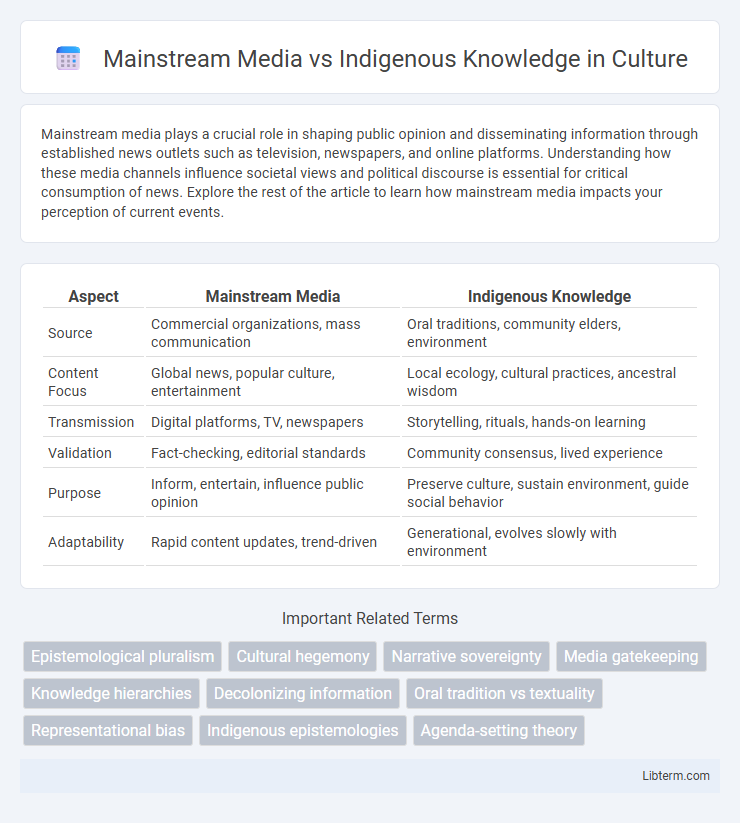Mainstream media plays a crucial role in shaping public opinion and disseminating information through established news outlets such as television, newspapers, and online platforms. Understanding how these media channels influence societal views and political discourse is essential for critical consumption of news. Explore the rest of the article to learn how mainstream media impacts your perception of current events.
Table of Comparison
| Aspect | Mainstream Media | Indigenous Knowledge |
|---|---|---|
| Source | Commercial organizations, mass communication | Oral traditions, community elders, environment |
| Content Focus | Global news, popular culture, entertainment | Local ecology, cultural practices, ancestral wisdom |
| Transmission | Digital platforms, TV, newspapers | Storytelling, rituals, hands-on learning |
| Validation | Fact-checking, editorial standards | Community consensus, lived experience |
| Purpose | Inform, entertain, influence public opinion | Preserve culture, sustain environment, guide social behavior |
| Adaptability | Rapid content updates, trend-driven | Generational, evolves slowly with environment |
Understanding Mainstream Media: Definition and Influence
Mainstream media refers to large-scale news outlets and broadcasting organizations that widely shape public opinion through standardized content distribution channels. This media's influence affects societal norms, political discourse, and cultural perceptions by prioritizing dominant narratives that often marginalize indigenous perspectives. Understanding its mechanisms reveals how information control impacts the representation and visibility of indigenous knowledge systems.
What Constitutes Indigenous Knowledge?
Indigenous knowledge constitutes the traditional understandings, skills, and philosophies developed by Indigenous communities through generations of interaction with their environment. It includes holistic perspectives on ecology, medicine, agriculture, and social organization, deeply rooted in cultural practices and spiritual beliefs. This knowledge system contrasts with mainstream media's often standardized and externally imposed narratives by emphasizing localized, experiential learning and sustainability.
Historical Context: Media Narratives vs Traditional Wisdom
Mainstream media often frames historical events through dominant cultural perspectives, prioritizing narratives aligned with political and economic interests, which can marginalize indigenous knowledge systems rooted in centuries-old traditions. Indigenous knowledge, passed down orally and through lived experience, offers alternative interpretations of history, emphasizing community relationships with the land and spiritual connections frequently absent in mainstream accounts. Understanding this dichotomy is essential for recognizing how media narratives shape public perception and influence the preservation of indigenous heritage.
Representation of Indigenous Voices in Mainstream Outlets
Mainstream media often underrepresents Indigenous voices, leading to a skewed portrayal of Indigenous cultures and issues. Indigenous knowledge systems and perspectives are frequently marginalized or simplified, limiting public understanding and reinforcing stereotypes. Increasing authentic representation of Indigenous people in mainstream outlets fosters cultural respect and promotes accurate storytelling.
The Impact of Media Bias on Indigenous Issues
Media bias often skews the portrayal of Indigenous issues by emphasizing stereotypes and underrepresenting authentic Indigenous perspectives, leading to misinformed public opinions and policy decisions. Mainstream media tends to prioritize sensationalism over accuracy, which marginalizes Indigenous voices and obscures critical cultural and social contexts. This distortion hampers efforts for Indigenous rights recognition and perpetuates systemic inequalities within society.
Knowledge Preservation: Oral Traditions vs Digital Platforms
Indigenous knowledge is preserved through oral traditions that emphasize storytelling, rituals, and communal memory, ensuring cultural continuity across generations. Mainstream media leverages digital platforms to archive, disseminate, and validate information globally, enhancing accessibility but often risking cultural homogenization. The divergence between oral transmission and digital documentation highlights critical challenges in maintaining authenticity and contextual integrity within knowledge preservation efforts.
Ethical Considerations: Who Controls the Narrative?
Mainstream media often controls the narrative by prioritizing dominant cultural perspectives, which can marginalize Indigenous knowledge and ethical frameworks rooted in community values and land stewardship. Indigenous knowledge systems emphasize relational accountability and collective consent, challenging mainstream media's tendency toward sensationalism and authoritative storytelling. Ethical considerations demand inclusion, respect for intellectual sovereignty, and balanced representation to prevent cultural appropriation and misinterpretation.
Case Studies: Misreporting and Truth in Indigenous Stories
Case studies reveal frequent misreporting of Indigenous knowledge by mainstream media, often distorting cultural narratives and omitting critical context. Analysis of specific incidents shows how Indigenous voices and traditional ecological knowledge are marginalized, leading to misinformation and perpetuating stereotypes. Emphasizing Indigenous-led storytelling ensures accurate representation and preserves the authenticity of Indigenous worldviews.
Bridging the Gap: Collaborative Media Initiatives
Collaborative media initiatives play a crucial role in bridging the gap between mainstream media and Indigenous knowledge by promoting authentic representation and preserving cultural heritage. Projects such as community-driven documentaries and Indigenous-led broadcasting platforms ensure the inclusion of Indigenous voices in storytelling, fostering mutual understanding and respect. These initiatives leverage digital technology to amplify Indigenous perspectives, creating a more inclusive and diverse media landscape.
The Future: Empowering Indigenous Knowledge in Modern Discourse
Empowering Indigenous knowledge in modern discourse requires integrating traditional ecological practices with contemporary scientific research to address climate change and biodiversity loss. Media platforms must amplify Indigenous voices by prioritizing storytelling that honors cultural heritage and ancestral wisdom, fostering cross-cultural understanding and respect. This approach promotes resilient communities while enriching global knowledge systems with diverse perspectives and sustainable solutions.
Mainstream Media Infographic

 libterm.com
libterm.com